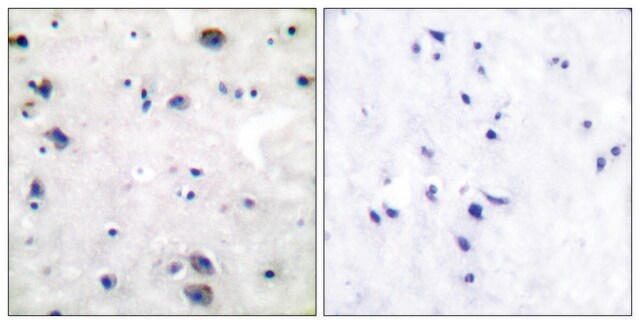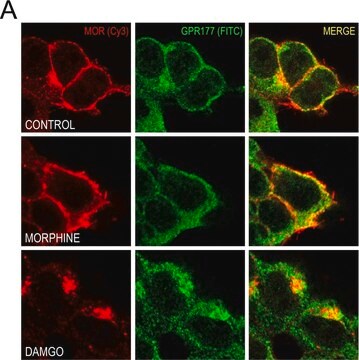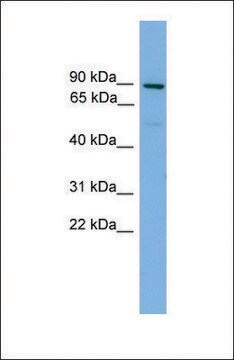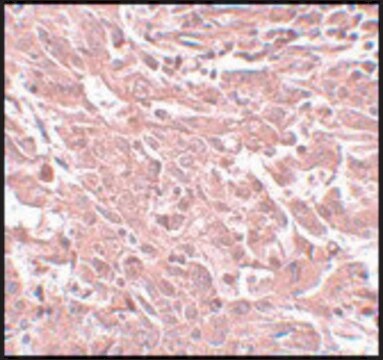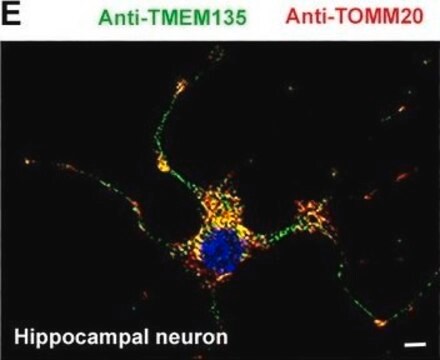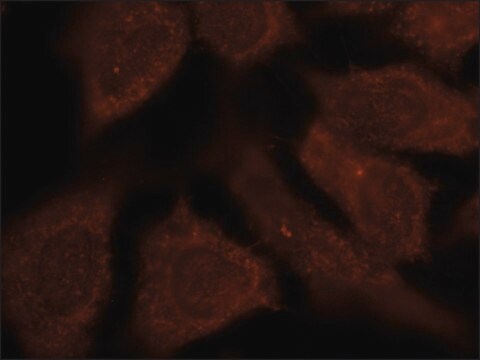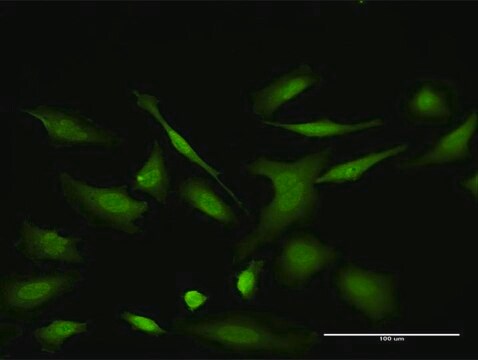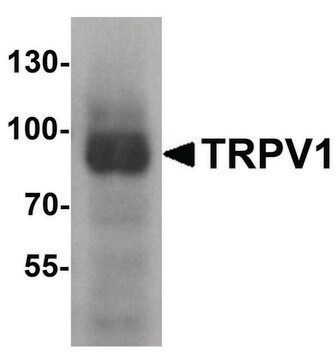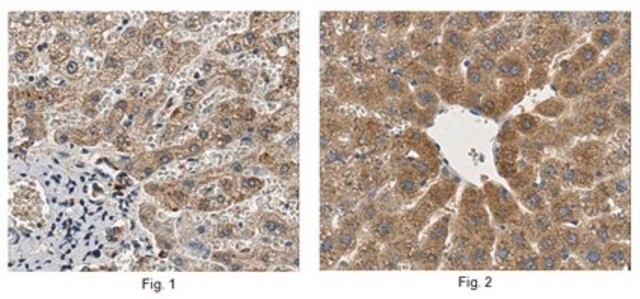SAB4300555
Anti-OPRM1 (Ab-375) antibody produced in rabbit
affinity isolated antibody
同義詞:
Anti-KIAA0403 antibody produced in rabbit, Anti-MOR antibody produced in rabbit, Anti-MOR1 antibody produced in rabbit, Anti-OPRM antibody produced in rabbit, Anti-opioid receptor, mu 1 antibody produced in rabbit
登入查看組織和合約定價
全部照片(1)
About This Item
分類程式碼代碼:
12352203
NACRES:
NA.41
推薦產品
生物源
rabbit
共軛
unconjugated
抗體表格
affinity isolated antibody
抗體產品種類
primary antibodies
無性繁殖
polyclonal
形狀
buffered aqueous solution
分子量
~80 kDa
物種活性
mouse, rat
濃度
1 mg/mL
技術
western blot: 1:500-1:1000
同型
IgG
免疫原序列
(H-P-S-T-A)
NCBI登錄號
UniProt登錄號
運輸包裝
wet ice
儲存溫度
−20°C
目標翻譯後修改
unmodified
基因資訊
human ... OPRM1(4988)
一般說明
The gene OPRM1 (opioid receptor μ 1) is mapped to human chromosome 6q24-q25. The gene spans a length of 200kb and contains 11 exons that yield 17 splice variants.
免疫原
Peptide sequence around aa. 373-377 (H-P-S-T-A), according to the protein OPRM1.
應用
Anti-OPRM1 (Ab-375) antibody produced in rabbit has been used in Western blotting.
生化/生理作用
The gene OPRM1 (opioid receptor μ 1) encodes a μ opioid receptor that functions in pain perception and addiction to drugs of abuse, such as cocaine, nicotine and alcohol. It serves as a target for opioid drugs, such as morphine, methadone and heroin and opioid peptides (like β - endorphin and endomorphins) and mediates their effects. Single nucleotide polymorphism in the OPRM1 gene is associated with an inclination to drug addiction and lesser response to painful stimuli.
特點和優勢
Evaluate our antibodies with complete peace of mind. If the antibody does not perform in your application, we will issue a full credit or replacement antibody. Learn more.
標靶描述
Inhibits neurotransmitter release by reducing calcium ion currents and increasing potassium ion conductance. Receptor for beta-endorphin.
外觀
Solution in phosphate-buffered saline containing 0.02% sodium azide and 50% glycerol
免責聲明
Unless otherwise stated in our catalog or other company documentation accompanying the product(s), our products are intended for research use only and are not to be used for any other purpose, which includes but is not limited to, unauthorized commercial uses, in vitro diagnostic uses, ex vivo or in vivo therapeutic uses or any type of consumption or application to humans or animals.
未找到適合的產品?
試用我們的產品選擇工具.
儲存類別代碼
10 - Combustible liquids
水污染物質分類(WGK)
WGK 1
閃點(°F)
Not applicable
閃點(°C)
Not applicable
Association of time-dependent changes in μ opioid receptor mRNA, but not BDNF, TrkB, or MeCP2 mRNA and protein expression in the rat nucleus accumbens with incubation of heroin craving.
Theberge FR, et al.
Psychopharmacology (Psychopharmacologia), 224(4), 559-571 (2012)
Ying Zhang et al.
The Journal of biological chemistry, 280(38), 32618-32624 (2005-07-28)
As a primary target for opioid drugs and peptides, the mu opioid receptor (OPRM1) plays a key role in pain perception and addiction. Genetic variants of OPRM1 have been implicated in predisposition to drug addiction, in particular the single nucleotide
Raymond F Anton et al.
Archives of general psychiatry, 65(2), 135-144 (2008-02-06)
Naltrexone hydrochloride treatment for alcohol dependence works for some individuals but not for everyone. Asn40Asp, a functional polymorphism of the mu-opioid receptor gene (OPRM1), might predict naltrexone response. To evaluate whether individuals with alcoholism who are heterozygous (Asp40/Asn40) or homozygous
Shinya Kasai et al.
Pharmacogenomics, 12(9), 1305-1320 (2011-09-17)
The µ-opioid receptor is a primary target for clinically important opioid analgesics, including morphine, fentanyl and methadone. Many genetic variations have been identified in the human µ-opioid receptor MOP gene (OPRM1), and their implications have been reported in the effects
Jörn Lötsch et al.
Anesthesiology, 97(4), 814-819 (2002-10-03)
Some, but not all, patients with renal dysfunction suffer from side effects after morphine administration because of accumulation of the active metabolite morphine-6-glucuronide (M6G). The current study aims to identify genetic causes that put patients at risk for, or protect
我們的科學家團隊在所有研究領域都有豐富的經驗,包括生命科學、材料科學、化學合成、色譜、分析等.
聯絡技術服務